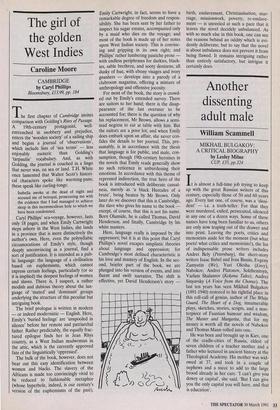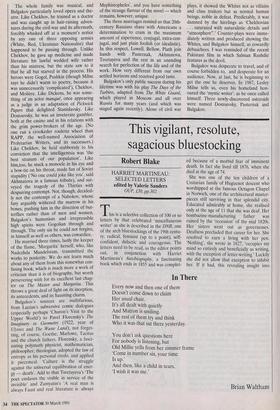Another dissenting adult male
William Scammell
MIKHAIL BULGAKOV: A CRITICAL BIOGRAPHY by Lesley Milne CUP, £35, pp.324 It is almost a full-time job trying to keep up with the great Russian writers of this century, especially those of 50 and 60 years ago. Every last one, of course, was a 'dissi- dent' — i.e. a truth-teller. For that they were murdered, exiled, persecuted, silenced in any one of a dozen ways. Some of these names have long been familiar to us, others are only now leaping out of the drawer and into print. Leaving the poets, critics and memoirists aside for the moment (but what poets! what critics and memoirists!), the list of indispensable prose writers includes Andrei Bely (Petersburg), the short-story writers Isaac Babel and Ivan Bunin, Evgeny Zamyatin (We), Yuri Olesha (Envy), Nabokov, Andrei Platonov, Solzhenitsyn, Varlam Shalamov (Kolyma Tales), Andrei Sinyaysky (A Voice from the Chorus). The last ten years has seen Mikhail Bulgakov (1891-1940) restored to his rightful place in this roll-call of genius, author of The White Guard, The Heart of a Dog, innumerable plays, sketches, stories, scripts, and a mas- terpiece of Faustian humour and wisdom, The Master and Margarita, that for my money is worth all the novels of Nabokov and Thomas Mann rolled into one.
He was born and brought up in Kiev, one of the cradle-cities of Russia, eldest of seven children of a teacher mother and a father who lectured in ancient history at the Theological Academy. His mother was wid- owed at 37, and took in a couple of nephews and a niece to add to the large brood already in her care. 'I can't give you dowry or capital', she said. 'But I can give you the only capital you will have, and that is education'.
The whole family was musical, and Bulgakov particularly loved opera and the- atre. Like Chekhov, he trained as a doctor and was caught up in hair-raising adven- tures during the civil war and its aftermath, forcibly whisked off at a moment's notice by any one of three opposing armies (White, Red, Ukrainian Nationalist) that happened to be passing through. Unlike Chekhov, he gave up medicine and made literature his lawful wedded wife rather than his mistress, but the state saw to it that he all but starved in the process. His heroes were Gogol, Pushkin (though Milne says he didn't warm to poetry, because it was unnecessarily 'complicated), Chekhov, and Moliere. Like Dickens, he was some- thing of an actor manqué, once appearing as a judge in an adaptation of Pickwick Papers that delighted Stanislaysky. Like Dostoevsky, he was an inveterate gambler, both at the casino and in his relations with the grim power-brokers of the age. (No one ran a crookeder roulette wheel than RAPP, the well-named Association of Proletarian Writers, and its successors.) Like Chekhov, he held stubbornly to his conviction that the intelligentsia was 'the best stratum of our population'. Like him,too, he stuck a monocle in his eye and a bow-tie on his throat, made fun of Soviet stupidity (`No one could joke like you', said Akhmatova in a famous tribute), and sur- veyed the tragedy of the Thirties with despairing contempt. Not, though, decided- ly not the contempt of a Nabokov, whose fury arguably withered the marrow in his bones, pushing him in the direction of but- terflies rather than of men and women. Bulgakov's humanism and irrepressible high spirits were Gogolian through and through. The only sin he could not forgive, in himself as well as others, was cowardice.
He married three times, lastly the keeper of the flame, 'Margarita' herself, who, like Nadezhda Mandelstam, transmitted the works to posterity. We do not learn much about any of them from this somewhat con- fusing book, which is much more a work of criticism than it is of biography, but worth persevering with for its excellent last chap- ter on The Master and Margarita. This throws a great deal of light on its inception, its antecedents, and its haunting charm.
Bulgakov's sources are multifarious, from Lucian's subversive comic dialogues (especially perhaps 'Charon's Visit to the Upper World') to Pavel Florensky's The Imaginary in Geometry (1922, year of Ulysses and The Waste Land), not forget- ting, of course, Goethe, Marlowe, Tacitus and the church fathers. Florensky, a fasci- nating polymath physicist, mathematician, philosopher, theologian, adopted the law of entropy as his personal credo, and applied it piecemeal. 'Culture is the struggle against the universal equilibration of ener- gy — death'. Add to that Tsvetayeva's 'The poet enslaves the visible in service of the invisible' and Zamyatin's 'A real man is always Faust and real literature is always
Mephistopheles', and you have something of the strange flavour of the novel — which remains, however, unique.
The three marriages remind us that 20th- century Russians share with Americans a determination to cram in the maximum amount of experience, conjugal, extra-con- jugal, and just plain foolish (or idealistic). In this respect, Lowell, Bellow, Plath join hands with Pasternak, Akhmatova, Tsvetayeva and the rest in an unending search for perfection of the life and of the work. How very different from our own settled horizons and received good taste.
Bulgakov's only public success during his lifetime was with his play The Days of the Turbins, adapted from The White Guard, which played in Moscow and all over Russia for many years (and which was staged again recently). Alone of civil war
plays, it showed the Whites not as villains and class traitors but as normal human beings, noble in defeat. Predictably, it was damned by the hirelings as `Chekhovian . . . saturated with naturalistic details and "atmosphere".' Counter-plays were imme- diately written and produced showing the Whites, and Bulgakov himself, as cowardly debauchees. I was reminded of the recent Pakistani film in which Salman Rushdie features as the devil.
Bulgakov was desperate to travel, and of course forbidden to, and desperate for an audience. Now, at last, he is beginning to get the one he deserves. In 1987, Lesley Milne tells us, even his homeland hon- oured the 'mystic writer', as he once called himself. Three newly-discovered asteroids were named Dostoevsky, Pasternak and Bulgakov.



















































 Previous page
Previous page